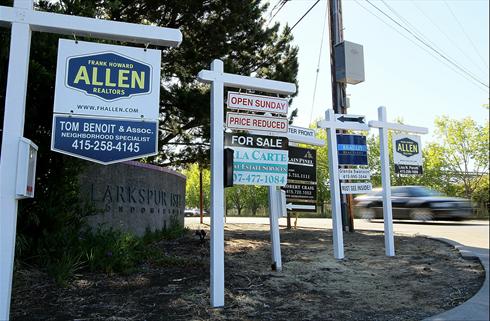Stephanie Armour
USA Today

Real estate signs are posted in front of housing development in Larkspur, Calif., in May. By Justin Sullivan, Getty Images
Home prices are widely expected to fall now that a tax credit for home buyers has expired.
That’s raising concern about a possible double dip in home prices.
National housing prices stopped falling early last year and rose 0.3% over the 12 months ending in February, according to a study by real estate analytics firm CoreLogic.
The firm predicts prices will fall this year before starting to rise again in late 2010. Even so, next February’s prices are likely to be 4.2% lower, it forecasts.
“Home prices will struggle for maybe another year,” says Mark Fleming, CoreLogic’s chief economist.
A shrunken pool of buyers due to the tax credit’s expiration is one reason.
“The tax credit is the big reason home prices have been so buoyant, and sales will drop” with its expiration, says Paul Ashworth of Capital Economics. “You will see a double dip in housing prices.”
Another reason is the number of distressed houses — including foreclosures and short sales — that are on the market or that will be in coming months.
Distressed homes, typically sold at discounted prices, accounted for 36% of first-quarter sales, the National Association of Realtors reported Tuesday. The first quarter’s median single-family home price ($166,100) was roughly flat with a year earlier, despite gains in nearly two-thirds of 152 metro areas that the NAR surveys.
The NAR’s survey isn’t the first to show evidence of softening prices. The 20-city Standard & Poor’s/Case-Shiller Home Price Index has fallen for five-consecutive months through February.
“It is too early to say the housing market is recovering,” David Blitzer, chairman of S&P’s index committee, said when the Case-Shiller report for February was released last month.
There may be some good news for sellers in areas not hit so hard by foreclosures. When distressed sales are excluded, CoreLogic’s Home Price Index shows a 4.9% rise in U.S. prices from this February through next February.
While some economists expect home prices to weaken, they don’t expect a major drop.
“I wouldn’t expect anything like the meltdown we’ve had over the past couple years,” says Jay Feldman, senior economist at Credit Suisse.

